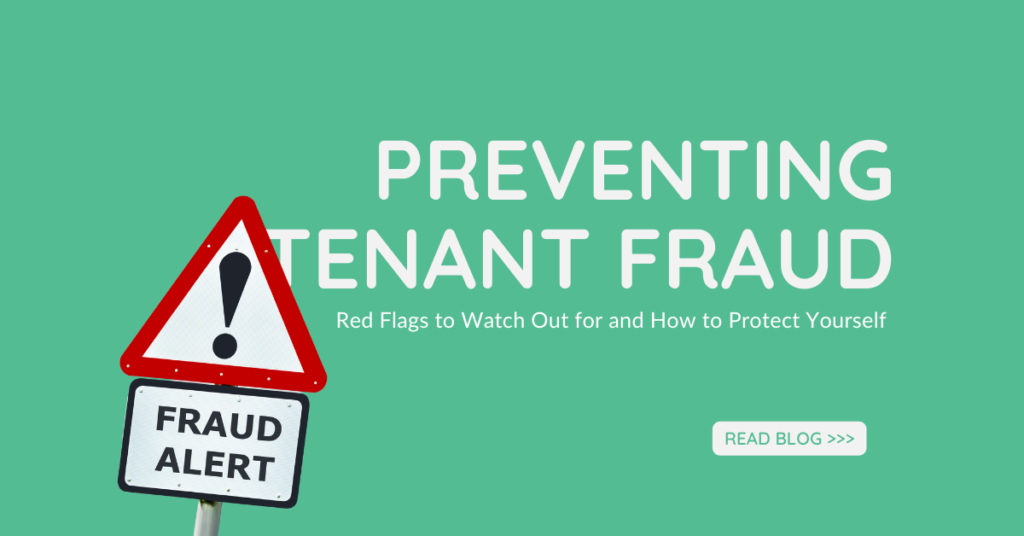Preventing Tenant Fraud: Red Flags to Watch Out For and How to Protect Yourself
Reading Time: 4 minutesFinding a good tenant is crucial for any landlord. Unfortunately, the rental market can also attract fraudsters looking to exploit unsuspecting property owners. Tenant fraud can take various forms, from fake applications to schemes involving property damage or subletting violations. The consequences can be significant, leading to lost rent, legal battles, and even damage to…

Finding a good tenant is crucial for any landlord. Unfortunately, the rental market can also attract fraudsters looking to exploit unsuspecting property owners. Tenant fraud can take various forms, from fake applications to schemes involving property damage or subletting violations. The consequences can be significant, leading to lost rent, legal battles, and even damage to your property.
The good news is that you can significantly reduce your risk by being aware of the red flags and taking proactive measures to protect yourself. Here’s what you need to know:
Table of Contents
Red Flags During the Application Process

The application stage is your first chance to identify potential tenant fraud. Here are some key red flags to watch out for:
Application Issues
- Inconsistent or Incomplete Information: Look for discrepancies between the application form, references, and any other documentation provided. Missing information about previous addresses, employers, or contact details can be a red flag.
- Duplicate Addresses or Phone Numbers: This could indicate the applicant is using fake information or applying for multiple properties under false pretenses. Be wary if multiple applications appear with the same contact details.
- Unwillingness to Provide Proper Identification: A legitimate tenant should have no problem providing valid government-issued ID (driver’s license, passport) and proof of Social Security number (if applicable).
Financial Issues
- Unverifiable Income or Employment: Always require applicants to provide proof of income, such as pay stubs or tax returns. If the information cannot be verified through contact with the employer or tax records, proceed with caution.
- Poor Credit History (if applicable): While not an automatic disqualifier, a very poor credit score can indicate financial instability and a potential risk of late rent payments. Consider setting a minimum credit score requirement for your rentals.
- Pressure to Bypass Credit Checks: A legitimate applicant should understand the importance of credit checks for rental applications. If someone pressures you to skip this step, it’s a major red flag.
- Offers Unusually Large Deposits or Upfront Payments: While some tenants may offer extra security deposits, be wary of excessively large sums. This could be a tactic to gain your trust while planning to skip out on future rent payments.
Urgency and Unusual Requests
- Rushing the Application Process: A legitimate applicant should be willing to go through the application process thoroughly. If someone seems overly eager to move in quickly and bypass standard procedures, be cautious.
- Offering to Pay Rent Significantly in Advance: This could be a ploy to secure the property before you discover any red flags. Always require rent payments according to the lease agreement.
- Unwillingness to See the Property in Person: A genuine renter will want to see the place they’re considering living in. If someone hesitates to schedule a viewing, it raises concerns about their true intentions.
- Requests for Unreasonable Modifications: Be wary of applicants who ask for extensive or impractical modifications to the property, especially before they’ve even seen it.
Protecting Yourself from Tenant Fraud

A thorough screening process is essential to weed out fraudulent applicants. Require a formal application with a reasonable fee. Following up with references, including previous landlords and employers, is crucial. When legal and allowed in your area, conducting credit and background checks can provide valuable insights. Consider using professional tenant screening services for added security.
Once you’ve chosen a tenant, a clear and comprehensive lease agreement is vital. The agreement should outline tenant responsibilities regarding rent payment, maintenance, and other obligations. Clearly specify consequences for lease violations to deter bad behavior. Finally, require proper documentation like proof of income and valid identification from the tenant.
Staying Vigilant During Tenancy
Your job doesn’t end after the lease is signed. Monitor rent payments closely and address late payments promptly. Conduct periodic property inspections with proper notice to ensure the tenant is maintaining the property as agreed. Be aware of subletting violations, which can be a major issue.
Conclusion
By remaining cautious yet professional throughout the rental process, you can significantly reduce your risk of encountering tenant fraud. Remember, trust your gut instinct, and don’t hesitate to walk away from a suspicious application. If you’re unsure about any aspect of the process, consider consulting with a property management professional or legal expert for guidance.
Protecting yourself from tenant fraud can be a complex process, especially for landlords who manage their properties themselves. Green Ocean Property Management has over 40 years of experience in the Greater Boston area, and we can help you navigate the rental process with confidence. Our thorough screening procedures, combined with our expert property management services, can give you peace of mind knowing your investment is protected.
Contact Green Ocean Property Management today for a free consultation. Let us help you find a qualified tenant and ensure a smooth and successful rental experience.
Preventative Maintenance Checklist for Rental Units
Reading Time: 3 minutesAs a landlord, ensuring your rental unit is well-maintained is crucial. Not only does it benefit your tenants by providing them with a safe and comfortable living environment, but it also saves you money in the long run. By implementing a preventative maintenance plan, you can catch minor issues before they escalate into costly repairs,…
How Do We Make Sure that You Work with Reliable Vendors
Reading Time: 2 minutes One of the most valuable things that we have access to as a property management company is reliable vendors. Having reliable vendors did not happen overnight. We, just like every other landlord had to go through tons and tons of different vendors that gave us issues. Vendors not showing up on time, trying…
The Impact of Seasonal Maintenance on Property Value
Reading Time: 3 minutesMaintaining a home is not just about keeping it looking good; it’s also essential for preserving and increasing its value. Seasonal maintenance plays a crucial role in this process. By performing specific tasks throughout the year, homeowners can ensure their properties remain in top condition, leading to higher market value and a more enjoyable living…








